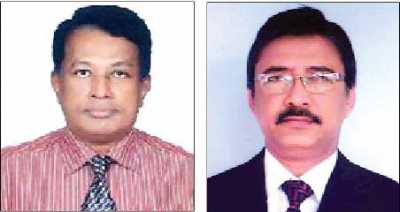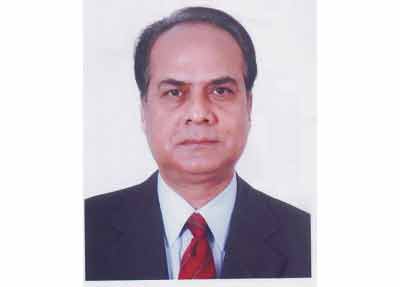Banking
BB gets two new EDs .
 Abdul Haque-Naushad Ali
Abdul Haque-Naushad Ali
Md Abdul Haque and Mohammad Naushad Ali Chowdhury, general managers of Bangladesh Bank, were promoted to Executive Directors. The central bank on Monday announced the promotion.
Md Abdul Haque joined the central bank as Assistant Director in July 1981. After joining he worked in many departments including BCD (at present BRPD), DBI, FEPD, ACSPD (ACD+SME), CBSP, FRTMD.
Prior to his new assignment, he was General Manager of newly formed department of the central bank - Deposit Insurance Department (DID).
Mohammad Naushad Ali Chowdhury, was the GM of Bangladesh Bank Chittagong office. During his long career in Bangladesh Bank, he attended different seminars and workshops on Banking issues in different countries including USA and UK.
Prior to his new assignment, Chowdhury worked at different departments of head office as well as branch offices of the central Bank.
The Daily Sun/Bangladesh/ 25th Jan 2012
Sonali’s time extension of loss amortisation proposal rejected
Bangladesh Bank (BB) has rejected a time extension proposal of state-owned Sonali Bank, which sought amortisation process of its accumulated loss of Tk 54.38 billion in next 19 years instead of government-set time period of 10 years.
When the national commercial bank was turned into company in the year 2007, its accumulated losses were estimated at Tk 54.38 billion. At that time the central bank had asked the bank to pay back the amount in next 10 years through its annual profits.
But recently, as per a 20-year development plan of Sonali, it sought to repay the amount in next 19 years, instead of previously fixed 10 years, sources said.
Amortisation means a periodic payment plan to pay a debt or accumulated loss in which the interest and a portion of the principal is included in each payment by an established mathematical formula and the accumulated loss amount is treated as goodwill BB rejected the proposal of Sonali to extend the time as such time extension will not create usefulness for the country’s largest state-owned bank, a senior Banking Division official said on Tuesday.
The official also said the huge accumulated loss of Sonali will turn into goodwill through amortisation process within next 10 years.
Credit and Sick Industry Branch of BB sent a letter to the Banking Division last week on the issue.
Earlier, Managing Director and Chief Executive Officer of Sonali Bank, M Humayun Kabir, through a proposal sought time extension of the amortisation of losses in next 20 years.
According to the proposal sent to finance ministry, Sonali wanted to amortise a loss of Tk 54.38 billion against yearly its profit earning in next 19 years with yearly amortisation of Tk 2.86 billion.
Sonali amortised Tk 2.86 billion of its yearly profit against accumulated loss in 2010, Tk 5 billion in 2009, and Tk 3.50 billion in 2008, said the proposal.
When contracted over phone on Tuesday, Sonali Bank MD and CEO Md Humayun Kabir declined to comment on the matter.
The risk assets of Sonali remained at an alarming stage in the first nine months of 2011( January-September period) calendar year because of weak recovery of its default loans and high borrowings from the call money market.
As per the report, risk assets of Sonali decreased by 9.71 per cent in 2011 compared to Tk 326.90 billion in 2010 calendar year.
According to statistics, in October 2011, Sonali had risk–based assets worth Tk 326.90 billion.
The Daily Sun/Bangladesh/ 25th Jan 2012
Eastern Bank embarks on carbon trading
After reducing the use of electricity and paper at its office, Eastern Bank Ltd (EBL) is now gearing up for carbon trading to show its commitment to environment-friendly funding.
“Perhaps, we'll be the first Bank to claim refinance from the central bank for carbon credits,” said Ali Reza Iftekhar, managing director of the Bank.
Iftekhar said his Bank has reduced electricity consumption by 33 percent and paper use by 40 percent in 2011. Four branches and six automated teller machines of the Bank are run on solar power.
EBL also has the credit to fund $3 million (more than Tk 24 crore) to Rahimafrooz to install an 18-megawatt solar power panel a few years back.
Now the Bank has come up with 'Nobodoy', a customised loan product to green financing. Some 36 agri-based areas defined by the Bangladesh Bank can get the financing at a 10 percent interest rate.
Minimum loan will be Tk 2 lakh and maximum at Tk 70 lakh under the Nobodoy product and no collateral will be needed for up to Tk 10 lakh loan, according to Khurshed Alam, head of SME Banking of the Bank. The moratorium period is three months.
Iftekhar is upbeat about the new green product and vows to spread it across the country. The Bank has already disbursed nearly Tk 60 lakh to eight biogas plants in Cox's Bazar.
“It's a journey, not destination,” he said. “We've started in a smaller way, but there may be a revolution in the years to come,” he said.
The EBL boss now dreams of carbon trading, which is a growing business, especially in the developed countries. The global carbon market now tops $100 billion. Carbon trading could top $1 trillion a year by 2020, according to research firm New Carbon Finance. By then, carbon would rival oil as one of the largest commodity markets.
The Daily Star/Bangladesh/ 25th Jan 2012
Dhaka Bank gets additional MD

Niaz Habib has joined Dhaka Bank as additional managing director, the bank said in a statement yesterday.
He started his career with Bangladesh Shilpa Bank (Now Bangladesh Development Bank Ltd) as a financial analyst in 1978.
Habib worked with American Express Bank Ltd for 21 years. He also served in senior management positions in Eastern Bank, United Commercial Bank, AB Bank and Premier Bank, according to the statement.
The Daily Star/Bangladesh/ 25th Jan 2012
50pc bank loan for car ends
Gone are the days when you could buy a car paying half the price and the bank loaning you the rest of the money. A Bangladesh Bank decision on Sunday reined in consumer loans such as car loans in the unproductive sector.
A circular issued by the central bank said the margin ratio for car loans and all other unproductive loans had been raised to 30:70, which means 70 per cent of the expense must be borne by the consumer and bank loans will only provide for the remaining 30 per cent.
The margin to loan ratio was 50:50 before this decision. This means consumers can only take loans for cars and other consumer goods if they can pay for 70 per cent of it out of their own pockets.
The ratio in housing finance loans on the other hand have been changed to 70:30 from 80:20, which is a smaller change of proportions.
The circular entailing the measures, signed by central bank’s Banking Regulation and Policy Department head K M Abdul Wadud, took effect immediately.
The Daily Independent/Bangladesh/ 24th Jan 2012



